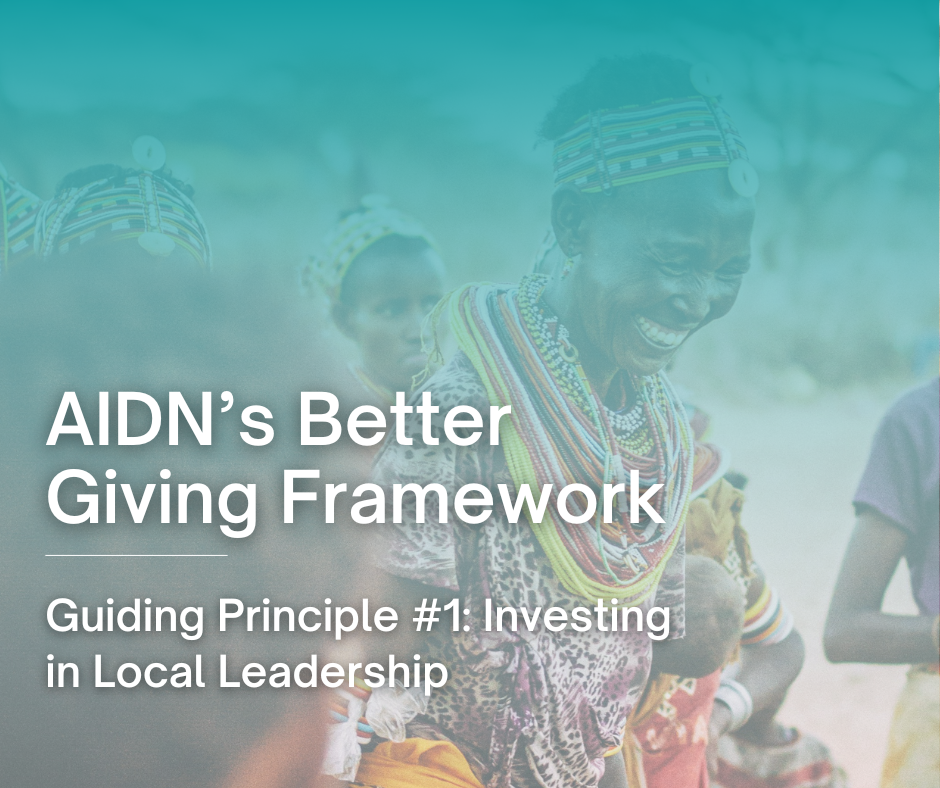AIDN’s Better Giving Framework is a key resource for funders that shares what we believe, and what our network has helped us to understand, are the key principles that underpin “better” giving and investing in today’s international development sector. The first Guiding Principle of our Better Giving Framework is: “Those closest to the problem, have the best solutions”: investing in local leadership. Read below to learn more about and access detailed resources on Guiding Principle #1.
For too long it has been shown that external or foreign decision making, underpinned by unequal power structures between actors in the “Global North” and “Global South”, has not led to appropriate solutions or sustainable outcomes in international development. It has also been shown that the majority of Official Development Assistance (ODA) and philanthropic funding continues to go to international NGOs (INGOs) as opposed to grass-roots organisations.
On the other hand, time and time again, AIDN’s network has confirmed a simple but powerful Guiding Principle: “those closest to the problem, have the best solutions”. This ethos rings particularly true in international development because the impact or outcome of development programs can vary significantly between suburb to suburb, town to town, let alone across borders. In this context, processes of “localisation”, investing in local leadership, or giving local communities more agency in addressing their own issues has become a formative concept in today’s international development and philanthropy sector.
Inherently related to other key development concepts such as “decolonising development” and “trust-based philanthropy”, at its core, investing in local leadership is about ensuring the most appropriate, sustainable and impactful solutions, rebalancing power and democratising decision-making. Whilst being realistic about the fact that there are complex challenges to overcome in the international settings where we work, localisation is about recognising the value of local knowledge and expertise to identify gaps and highlight solutions to these challenges. No matter where you are in the world, local actors have a more nuanced and appropriate understanding of their communities, needs and socio-political context.
By leveraging knowledge based on lived experience, localisation is about developing more relevant, effective, and sustainable solutions. Organisations such as Dandelion Africa and Pivot have empowered local leaders to design and manage health, education, and economic programs tailored to their communities’ needs.
That said, it is important to note that localisation does not mean that there is no role for the funder or external actors at all, or that all or perfect solutions exist within communities. Like with all sectors, there can still be merit in sharing external views or expertise from other organisations or international actors – if it is done through a process of collaboration, and resource, technical, capacity or funding gaps are identified and wanted by local actors.
For example, an important step in igniting processes of localisation is working with local leaders to identify which areas can be localised and which areas may require further technical assistance from external actors and funders, local NGOs or INGOs. If there are no local staff available to undertake monitoring and evaluation requirements (especially those required by the funder), then this would be an opportunity for the funder to share external expertise or appropriate capacity building or training for local staff.
For more resources on localisation and local leadership see here:
- “AIDN’s Better Giving Framework Webinar #1: Local leadership and trust-based philanthropy” featuring Evelyn Omala, Clay O’Brien, Professor Stephen Howes and Doris King.
- “Seeding by Ceding” by MacKenzie Scott for Medium 2021
- “Localisation: a paradigm shift towards local leadership in the Global South” by Deborah Mowesley for Civicus 2023;
- “Rethinking localisation – Beyond the illusion” by Tara Winkler for The AIDN Beat. 2025
- “Philanthropy’s role in realising the localisation agenda” – webinar from the Council on Foundations 2022
- Unlearning the “Master’s Tools”: Can international development be decolonised?” by Ryan Sutherland for Yale Journal of International Affairs 2023
- Dear INGOs, localisation needs local leaders, not boxes ticked” by Rita Panicker and Amanda Griffith for Devex 2024
- Evelyn Omala on building trust, funding local leaders and creating lasting impact” – AIDN’s Philanthropod 2022 with Evelyn Omala – Grassroots Portfolio Manager at Partners for Equity
- Life in Madagascar, re-orientating the power balance back to the community, and walking in the steps of Paul Farmer to achieve health equity” – AIDN’s Philanthropod 2023 with Tara Loyd – Executive Director of PIVOT
- For conservation efforts to move forward we must center Indigenous voices and take a human rights-centric approach” by Mahum Qazi (Project Expedite Justice) for The AIDN Beat 2024
- “DFAT’s new disability equity and rights strategy: an opportunity to shift the dial” by Jane Edge (CBM Australia) for The AIDN Beat 2023
- “The Sidekick Manifesto – A Blue Collar Professor Project” 2025
